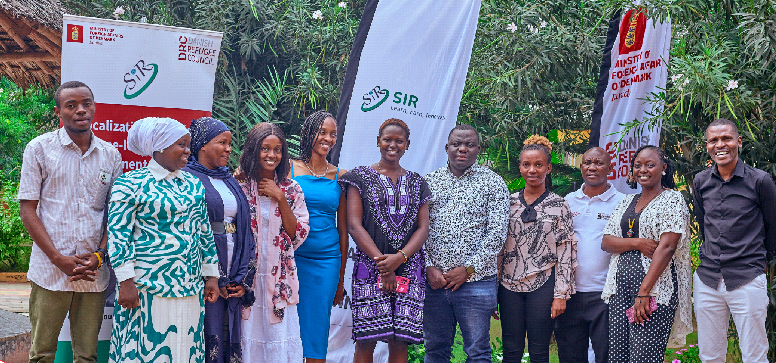Nakuor’s Journey from Kakuma Refugee Camp

Overcoming Obstacles and Finding Empowerment
Nakuor laughs as she reflects on her first days at the Digital Skills Hub in Kakuma Refugee Camp. Her journey into digital literacy wasn’t driven by ambition but by a genuine spark of curiosity. She had seen an advert at the camp’s gate, an opportunity to learn computer skills. For a young woman who had spent most of her life in the camp with limited access to formal education, it felt like an opportunity she couldn’t pass up.
“I was scared at first,” Nakuor admits. “I had never even touched a computer before. The idea that I could not only learn how to use a computer but also potentially earn money online was something I had never imagined possible for someone like me.” Nakuor’s story is not unique. In Kakuma, where opportunities to advance education are scarce and women are often sidelined due to cultural norms, initiatives like the Digital Skills Hub have been a lifeline for many young girls and women. The program, designed to equip young women with both foundational and advanced digital skills, offers more than just technical training, it brings renewed hope. It is a space where refugees like Nakuor can learn skills that open doors to opportunities beyond the confines of the camp.
Nakuor struggle of Starting Out at Kakuma Refugee Camp
Nakuor joined the second cohort of trainees, and her experience was far from smooth. The training began with high hopes, but the challenges quickly became apparent. With unreliable internet access and a scarcity of available computers, trainees often had to share devices or patiently wait for their turn. For Nakuor, who had to travel a long distance on foot from her
block to the training center, these logistical hurdles were disheartening.
“The only thing I knew about computers was how to turn them on.”
“Sometimes we’d go to the center, and there would be no internet for the entire day,” Nakuor recalls. “We couldn’t do anything. And when we
did have internet, the platforms we were using were so competitive. There would often be just a single task available, and whoever claimed it first got to work while the rest of us waited for the next opportunity.”
The frustration was palpable among the cohort. The initial platform they worked on, which was mainly focused on transcription tasks, posted jobs sporadically. When tasks were available, they were often challenging, requiring advanced english language skills that many of the trainees, including Nakuor, didn’t possess. Despite her hard work, Nakuor often found
herself earning as little as $0.20 for a day’s worth of effort. The promise of digital skills transforming her life felt distant, and she considered giving up more than once.
But Nakuor wasn’t alone. Her peers faced similar struggles, and the support they offered each other became a crucial factor in pushing through. “We would encourage each other,” Nakuor says. “When one of us got a task, we’d share tips on how to complete it faster or better. It wasn’t about competition between us, but about surviving together.”
The Turning Point: Mentorship and Support
A turning point came when the program introduced a mentorship component for Cohorts 5, 6, and 7. Nakuor was invited to return for the mentorship phase, and although she was initially hesitant, given her disappointing experience in the earlier cohort, she decided to take another chance.
“I didn’t want to come back at first,” Nakuor admits. “I felt like I had already failed. But the mentors were different. They showed us new platforms, and we got more support. They even helped us with the little things, like how to write a good profile or how to bid for jobs online.”
The mentorship program was a game-changer for Nakuor. She and her peers were introduced to alternative online platforms, reducing the pressure on the single transcription service that had been their only source of income. The mentors offered invaluable, practical advice, teaching the girls how to market their skills, navigate the complexities of online freelancing, and improve their chances of securing higher-paying opportunities.
Access to better equipment, though still limited, was another turning point. Although Nakuor didn’t have a laptop of her own, she was able to use the center’s computers for longer periods, especially when newer cohorts weren’t in session. These seemingly small changes had a profound impact.
“Now, I knew where to look for jobs and how to apply,” Nakuor says, her eyes lighting up as she recounts her first real success. “The first time I got paid for a task that I did well, it was only a few dollars, but it sure felt like a million.”
The Bigger Challenge: Life in the Camp
The difficulties of life in a refugee camp, however, didn’t end with better access to online platforms. Living in Kakuma brought daily struggles that made it hard to focus on long-term goals. As a woman in a predominantly patriarchal community, Nakuor faced societal expectations that she would stay at home and help with domestic chores or eventually marry and raise a family.
“People in my community didn’t understand why I was doing this. They didn’t see how computers could help us. Even my family thought it was a waste of time when I wasn’t bringing in any money in the beginning,” Nakuor shares.
These pressures were compounded by practical challenges. Nakuor’s block was far from the training center, and safety was a constant concern. “There were times when I couldn’t come
to the center because it wasn’t safe to walk that far alone,” she recalls. The lack of safe transportation and unreliable internet access at home forced her to make tough decisions about when and how often she could attend training sessions.
A New Sense of Confidence and Purpose
Despite the difficulties, Nakuor persevered. The digital skills she acquired didn’t just give her the tools to work online, they gave her a new sense of self-worth. “Before, I was shy. I didn’t talk much in groups, and I didn’t think my opinions mattered,” Nakuor says, her voice soft but steady. “Now, I’m different. I can speak up. I know I have something to offer.”
The training helped boost her self-confidence in unexpected ways. Through the program’s life skills courses, Nakuor learned to manage her time, set goals, and work independently, skills that not only helped her succeed in online work but also transformed her daily life. “I discovered that I can accomplish things on my own. I don’t have to wait for someone else to help me.”
As Nakuor’s confidence grew, so did her earning potential. Though still modest, her income from online tasks has become a vital part of her family’s survival. She contributes to household expenses and is saving to eventually buy her own laptop. “It’s not a lot, but it’s mine. I’m proud of what I’ve achieved, even though it took longer than I had hoped.”
Looking Ahead: Dreams of a Sustainable Future
Today, Nakuor continues to pursue online jobs, and her aspirations have expanded beyond just earning an income. She dreams of starting a small business, and perhaps one day mentoring other girls in the camp who are just beginning their digital journeys. “I want to help others, like my mentors helped me,” she says with a smile. “If I can do it, anyone can.”
Nakuor’s story is one of resilience and transformation. In an environment where opportunities are scarce and life is often constrained by various limitations, the Digital Hub has given her the means to break through some of the barriers. Her journey, despite the obstacles, highlights the transformative impact of education, mentorship, and unwavering determination, showing that success is achievable no matter where you begin.
